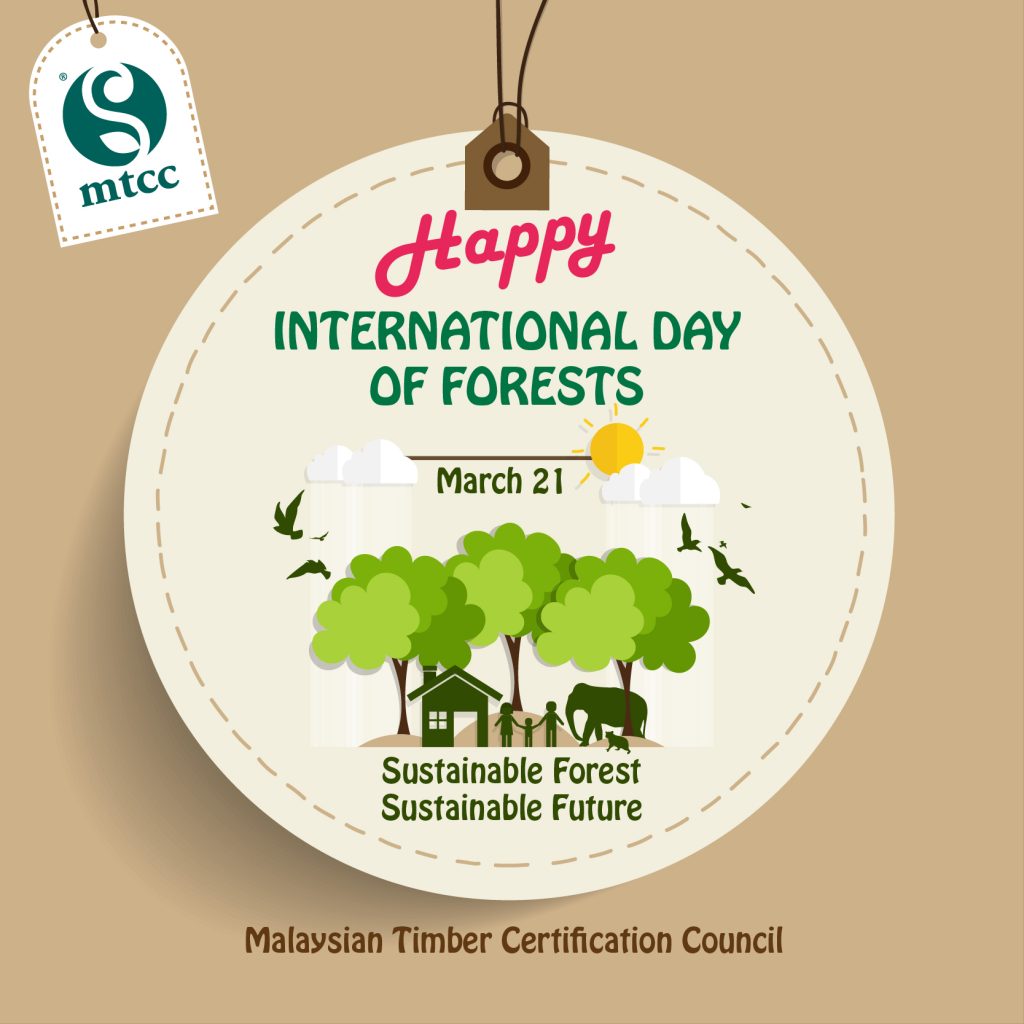Sustainable Forests and Sustainable Cities
MTCC joins the global communities in celebrating the United Nations -designated International Day of Forests on 21 March – a day dedicated to raise awareness of the importance of all types of forests and celebrate the manifold ways in which these forests sustain and protect us.
This global event aims to raise awareness of the importance of all types of forests and celebrate the manifold ways in which these forests sustain and protect mankind.
Themed “Forests and Sustainable Cities”, the 2018 celebration emphasises on “Let’s make our cities greener, healthier, happier places to live!” This tagline is most apt taking into account growing urbanisation and the fact that half of the world’s population today live in cities and the urban population is expected to surpass six billion by 2045. Just weeks ago, 165 nations congregated in Malaysia to participate in the Ninth Session of the “World Urban Forum” – a forum that is committed to finding solutions to create sustainable cities by 2030.
How would one define a sustainable city?
According to Kennedy et al [1], a sustainable city can only be one for which the inflow of material and energy resources, and the disposal of wastes, do not exceed the capacity of the city’s surrounding environment. In other words, for achieving environmental sustainability urban consumption must match or be below what the natural environment — such as forests, soil and oceans — can provide, and the resulting pollutants must not overwhelm the environment’s ability to provide resources to humans and other members of the ecosystem. Kennedy et al also highlighted the main challenge for today’s cities is to manage the heavy dependence on ecosystem services, which results in the depletion of natural resources and biodiversity and the efforts to mitigate and adapt to climate change, while prioritising public health and quality of life.
In general, environmental sustainability in the urban setting focuses on the roles of urban forestry and green spaces as carbon sinks, filter for air and noise pollution, improve local climate and in certain instances the provision of renewable energy as well as habitats and refuge for plants and animals, and in the process, helps to maintain and increase biodiversity in the cities.
From the perspective of MTCC, an independent organisation which was established to promote the implementation of sustainable forest management in Malaysia, the theme for celebration in Malaysia could well be worded as “Sustainable Forests and Sustainable Cities.” As reflected in tagline “Sustainable Forest, Sustainable Future”, MTCC holds the view that sustainable forest is all encompassing and key to Malaysia’s overall national sustainability agenda, including the sustainability of our cities.
One key aspect of the sustainability of city is inevitably the availability and affordability of clean water supply. Take the city of Kuala Lumpur as an example – undeniably the landscape of Kuala Lumpur has changed tremendously over the years. The KL Twin Towers are no longer the only high-rise towers around, with sky scrapers be it commercial buildings or residential blocks mushrooming and rising higher and higher into the air. Within each high-rise building, water pipes are laid and thousands of taps are fixed with expectation that water will flow from these taps upon the issuance of the certificate of fitness and keys to occupy the buildings or residential units. With regard to this matter, MTCC often posed this question in our interaction with our stakeholders, “Where do you think the water will come from to meet the increasing demand?” A very pertinent question that all concerned citizens should be interested in asking and knowing.
We need not elaborate the hardship of having no water supply and the woes it caused in our homes. The latest episode in early March where most of the areas in the Klang Valley were affected by a one-week water disruption is a case in point. The fear of water shortage is also reflected in the concerns frequently raised by many parties over the impacts of logging in Ulu Muda Forest Reserve, a water catchment forest in Kedah. Any disruption in water supply would affect the livelihood of some 4 million people and the economic activities in the State of Kedah, Perlis and Penang.
We definitely do not want what happened in Cape Town, South Africa to happen here. With dam levels predicted to decline to critically low levels, the city has announced plans for “Day Zero” in July 2018, when the Municipal water supply will largely be shut off, potentially making Cape Town the first major city to run out of water affecting some 4 million residents living within the city.
The benefits that forests provide to mankind have been too numerous to list. The provision of clean water is just one of them. Besides being the treasure trove of biodiversity for both plant and animal species, forests are also an economic resource and provide sustainable livelihood, energy, medicine and more importantly valuable ecosystem services. Our forests have been performing vital roles as carbon sink, excellent air filters, removing harmful pollutants and particles in the air and homes for the indigenous peoples.
Hence, MTCC advocates the importance of sustainable forest management to ensure the varied functions of the forests are protected for posterity and the well-being of the nation. In this context, MTCC is committed to promote the practice of sustainable forest management which includes the protection of water catchment forest through the implementation of the MTCS.
Sustainable forests. Sustainable Cities. Sustainable Future.

